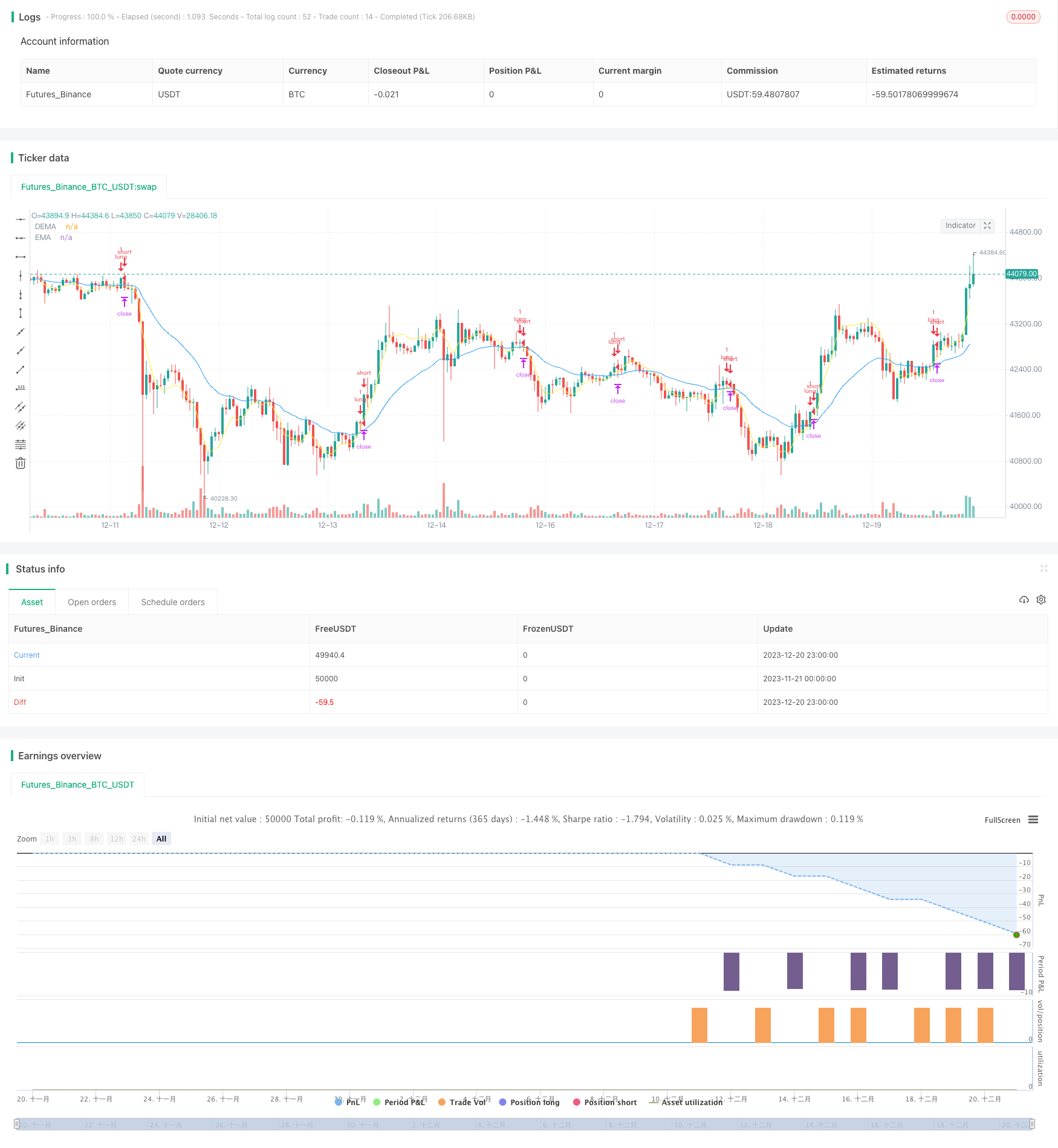
概述
该策略主要通过计算价格的双重EMA动量和DEMA动量的交叉以识别趋势,并结合ATR波动率指标来过滤假突破,实现了一个双动量指标与波动率过滤的量化交易策略。
策略原理
该策略主要包含以下几个部分:
计算价格的EMA和DEMA作为双重动量指标。其中较长周期的EMA反映长期趋势,DEMA作为更敏感的短期动量指标。当DEMA上穿EMA时生成买入信号。
计算ATR波动率指标。通过ATR的大小判断市场的波动率和流动性情况。波动率过大时过滤掉动量指标的信号,避免假突破。
ATR波动率通过参数化移动平均线来判断高低。当ATR波动率低于移动平均线时,允许动量指标信号的触发。
通过参数控制ATR时间周期、ATR长度、ATR移动平均线类型和长度等。
建立多头仓位的止损、止盈和追踪止损规则。
优势分析
这种双EMA过滤的策略,可以明显减少普通EMA金叉死叉策略中的假信号和频繁交易。加入ATR波动率指标后,可以有效过滤细微波动带来的误导信号,避免被套。
相比单一动量指标,该策略采用双指标设计,可以提高判断效果。DEMA作为更加灵敏的短期动量指标,配合稳定的长线EMA,形成比较可靠的组合信号。
通过调节ATR参数,可以针对不同标的物设定合适的波动率条件,提高策略的适用性。
风险分析
该策略最大的风险在于参数设置不当可能导致交易信号过于稀少。DEMA和EMA长度设置过长,或者ATR波动率界限设置过高,都可能减弱策略的实际运作效果。这需要通过反复测试来调整至最佳参数组合。
另一个潜在风险是,在极端行情中,价格波动可能突破ATR参数的约束,从而带来亏损。这需要人为监控市场异常情况,暂停策略运行。
优化方向
测试不同的动量指标参数组合,找到最佳参数。
尝试将动量指标由双EMA调整为MACD或其他指标。
测试不同的波动率指标设定,如整体历史ATR,市场波动率指数等。
增加对交易量的过滤,避免价格不真实突破的风险。
优化止损止盈机制,使盈亏比更优。
总结
该策略整合了动量指标与波动率分析,在扎实的理论基础上设计。通过参数调整和规则优化,可以成为一个稳定可靠的量化交易策略。其交易信号清晰,风险可控,值得实盘验证与应用。
/*backtest
start: 2023-11-21 00:00:00
end: 2023-12-21 00:00:00
period: 1h
basePeriod: 15m
exchanges: [{"eid":"Futures_Binance","currency":"BTC_USDT"}]
*/
// This source code is subject to the terms of the Mozilla Public License 2.0 at https://mozilla.org/MPL/2.0/
// © Qorbanjf
//@version=4
strategy("ORIGIN DEMA/EMA & VOL LONG ONLY", shorttitle="ORIGIN DEMA/EMA & VOL LONG", overlay=true)
// DEMA
length = input(10, minval=1, title="DEMA LENGTH")
src = input(close, title="Source")
e1 = ema(src, length)
e2 = ema(e1, length)
dema1 = 2 * e1 - e2
plot(dema1, "DEMA", color=color.yellow)
//EMA
len = input(25, minval=1, title="EMA Length")
srb = input(close, title="Source")
offset = input(title="Offset", type=input.integer, defval=0, minval=-500, maxval=500)
ema1 = ema(srb, len)
plot(ema1, title="EMA", color=color.blue, offset=offset)
// Inputs
atrTimeFrame = input("D", title="ATR Timeframe", type=input.resolution)
atrLookback = input(defval=14,title="ATR Lookback Period",type=input.integer)
useMA = input(title = "Show Moving Average?", type = input.bool, defval = true)
maType = input(defval="EMA", options=["EMA", "SMA"], title = "Moving Average Type")
maLength = input(defval = 20, title = "Moving Average Period", minval = 1)
//longLossPerc = input(title="Long Stop Loss (%)",
// type=input.float, minval=0.0, step=0.1, defval=1) * 0.01
longTrailPerc = input(title="Trail stop loss (%)",
type=input.float, minval=0.0, step=0.1, defval=50) * 0.01
longProfitPerc = input(title="Long Take Profit (%)",
type=input.float, minval=0.0, step=0.1, defval=3000) / 100
// === INPUT BACKTEST RANGE ===
FromMonth = input(defval = 1, title = "From Month", minval = 1, maxval = 12)
FromDay = input(defval = 1, title = "From Day", minval = 1, maxval = 31)
FromYear = input(defval = 2017, title = "From Year", minval = 2000)
ToMonth = input(defval = 1, title = "To Month", minval = 1, maxval = 12)
ToDay = input(defval = 1, title = "To Day", minval = 1, maxval = 31)
ToYear = input(defval = 9999, title = "To Year", minval = 2017)
// ATR Logic // atrValue = atr(atrLookback) // atrp = (atrValue/close)*100 // plot(atrp, color=color.white, linewidth=2, transp = 30)
atrValue = security(syminfo.tickerid, atrTimeFrame, atr(atrLookback))
atrp = (atrValue/close)*100
// Moving Average Logic
ma(maType, src, length) =>
maType == "EMA" ? ema(src, length) : sma(src, length) //Ternary Operator (if maType equals EMA, then do ema calc, else do sma calc)
maFilter = security(syminfo.tickerid, atrTimeFrame, ma(maType, atrp, maLength))
// variables for enter position
enterLong = crossover(dema1, ema1) and atrp < maFilter
// variables for exit position
sale = crossunder(dema1, ema1)
// stop loss
//longStopPrice = strategy.position_avg_price * (1 - longLossPerc)
// trail stop
// Determine trail stop loss prices
longStopTrail = 0.0
longStopTrail := if (strategy.position_size > 0)
stopValue = close * (1 - longTrailPerc)
max(stopValue, longStopTrail[1])
else
0
//Take profit Percentage
longExitPrice = strategy.position_avg_price * (1 + longProfitPerc)
//Enter trades when conditions are met
strategy.entry(id="long",
long=strategy.long,
when=enterLong,
comment="long")
//
strategy.close("long", when = sale, comment = "Sell")
//place exit orders (only executed after trades are active)
strategy.exit(id="sell",
limit = longExitPrice,
stop = longStopTrail,
comment = "SL/TP")